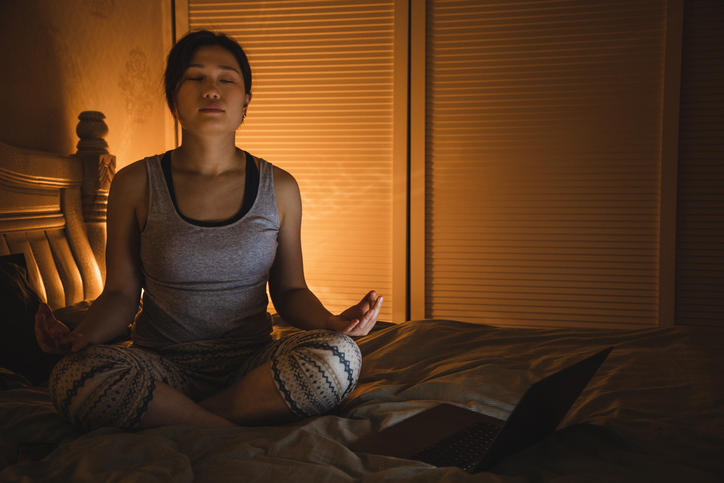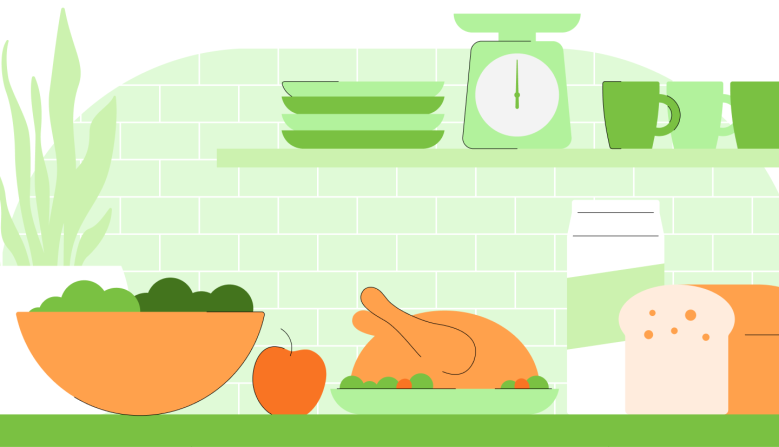5 Tips to Fall Back Asleep When You Wake Up in the Middle of the Night, According to a Sleep Specialist



You follow a normal nighttime routine. You limit caffeine in the afternoon. You’re getting good exercise and even have begun a meditation practice. You feel like you’re doing everything right. You fall asleep easily, but you wake up in the middle of the night and you’re wide awake. Sound familiar? You’re not alone. An estimated 20% of Americans deal with this frustrating issue. So, how exactly can you combat this to get back to sleeping soundly? We talked to sleep medicine specialist Scott Leibowitz, M.D., DABSM, FAASM, who helped explain why this happens, plus gave us his top five tips for falling back asleep when you wake up in the middle of the night.
What’s causing you to wake up in the first place?
According to Leibowitz, waking up during the night is normal. He says most people will wake up a few times during the night, but generally have no recollection of waking and are able to easily fall back asleep. However, there are times when we wake up and have trouble going back to sleep. When that happens, Leibowitz says that it is most often due to a loss of sleep inertia.
Sleep inertia is the state of transition between sleep and wake. Think of those moments when you first wake up … you’re confused, slow to move and want to go back to sleep. That is sleep inertia at work. When sleep inertia doesn’t work, you lose the ability to fall back asleep easily. So if loss of sleep inertia is what keeps us awake in the middle of the night, how do we get it back? Let’s start by identifying common culprits that have a negative impact on sleep inertia.
Medical conditions
It’s always important to rule out a medical condition if you are having sleep-related issues. Sleep apnea and sleep-related movement disorders can cause you to wake up and have trouble falling back asleep. Some medications can contribute to disrupted sleep as well, so it’s important to make an appointment with your primary care physician to rule out any medical or prescription-related issues.
Worrisome thoughts
Consider what’s on your mind when you wake up in the middle of the night. Anxiety and trouble sleeping are closely tied together. By using techniques to deal with stress and anxiety before you lie down at night, you allow your brain to deal with your worries while you are awake instead of allowing them to keep you up when you need to rest.
Alcohol
Alcohol is a double-edged sword. It helps you to fall asleep initially but as your body begins metabolizing it, sleep becomes disrupted and fragmented, which leads to middle of the night awakenings. If you’re encountering sleep-related issues, it’s best to limit or eliminate alcohol.
Environment
Think about your bedroom. Is it a restful environment? Environmental issues can be a major component of prolonged awakenings. Factors such as a room that’s too warm, sleeping with the television on, a partner’s snoring or uncomfortable pillows or mattresses can all be a part of the problem.
Going to bed too early
This sounds counterintuitive, right? You often hear people say, “Go to bed early to get a good night’s sleep!” And many sleep-hygiene regimens would suggest that you set a regular bedtime. But there is a problem with those recommendations: they don’t take into consideration how much sleep each individual actually needs.
Leibowitz explains, “My initial recommendation to 95% of the patients I evaluate with this problem is to push their bedtimes later, which helps to eliminate middle-of-the-night awakenings. Contrary to popular belief, going to bed early in order to get a ‘good night’s sleep’ will more often than not cause a worse night’s sleep.”
Every human has a clock in their brain which controls and regulates sleep. This biological clock is unique to each individual person, and it’s something that we can’t choose. Unfortunately, most of us also can’t choose every aspect of our daily schedule: school and work all start at specific times, so we have to find ways to manage our schedules and our body’s preferred sleep schedule.
To deal with this, Leibowitz suggests that we focus on the time we need to wake up versus the time we need to go to bed. Here’s why—if you are someone who needs seven hours of sleep and you go to bed at 10 p.m. and set your alarm for 7 a.m., you’re giving yourself a nine-hour window for sleep. Those extra two hours are going to show up somewhere—often in the middle of the night. So by going to bed later and giving yourself only the seven hours that you need based on the time you need to wake up, you eliminate the extra two hours of sleep time that aren’t needed by your body.
5 tips to fall back asleep when you wake up in the middle of the night
If you’ve followed all of the steps above—you’re healthy, you’ve got a good plan in place to deal with stress, you’re not drinking too much, you’ve set up a restful sleep environment and you’ve adjusted your sleep schedule—you should be sleeping like a baby! But you are still waking up in the middle of the night. What do you do?
First things first—get out of bed. Leibowitz says, “Lying in bed and ‘trying to sleep’ tends to be self-defeating. People tend to think about not being able to sleep. They try to sleep harder. They count the hours until they have to wake up. They stress about life. These are all sleep-prohibitive behaviors.”
His suggestion: If you’ve been lying in bed awake in the middle of the night for 30 minutes without sleeping, get out of bed. “It seems counterintuitive to get out of bed when you can’t sleep, and this is the hardest thing for most of my patients to actually do, as it would seem that if you get out of bed, you are definitely not going to fall back asleep. But this behavior actually increases the likelihood of falling back asleep for a more definitive block of sleep, as opposed to staying in bed and possibly dozing in and out of sleep for the remainder of the night.”
Once you get out of bed, there are a few things you can do—and a few you shouldn’t—to help yourself get sleepy again.
1. Do read a book.
Sit in a comfortable, dimly lit chair and read a book—an actual book with pages. Back-lit devices are a big no-go in the middle of the night. It could be helpful to have a cozy robe or blanket next to your bed that you can quickly reach for, to make pulling back the bed covers more manageable.
2. Do meditate.
Meditation apps now have meditations specifically designed to help you fall asleep, go back to sleep and stay asleep. Download an app and even have some meditations picked out in advance, so when you do wake up in the night, you only have to look at your phone for a few seconds to turn on the meditation.
3. Don’t get on your phone.
Looking at your phone will just wake you up even more and can cause your stress levels to go up, especially if you’re checking social media, emails or the news. Skip the temptation to scroll and maybe even keep your phone plugged in across the room at night (or in another room entirely).
4. Don’t turn on the TV.
Leibowitz suggests avoiding the TV, since programs are activating to our brains and will inhibit sleep inertia even more.
5. Do wait until you begin to feel sleepy to go back to bed.
Wait until you begin to feel sleepy again and then go back to bed, where falling asleep is more likely than it was when you first woke up.
Another option—Leibowitz says that while everyone is different, he personally sleeps with a light-blocking mask that has speakers in the mask to provide white noise. He shared, “For me it’s extremely soothing and helps with falling asleep and falling back asleep should I wake during the night.”
Bottom line
If you’re waking up in the middle of the night and having trouble falling back asleep, the best thing you can do is get out of bed. Either read an actual book or try meditating, and only go back to bed when you truly feel tired. “It is important to break the cycle of negative feedback in bed and ‘reboot’ the process. This also helps to reduce negative associations with the bed,” says Leibowitz. We want our time spent in bed to be spent actually sleeping, not lying awake, trying to sleep.
It’s important to note that if you have been having insomnia more than three days a week for more than 30 days or if your sleep disturbances are causing you distress, it’s time to go and see a specialist. You may be dealing with a true sleep disorder or an underlying medical condition and, in those cases, it’s important to seek the advice of a medical professional. To find a sleep specialist in your area, you can visit SleepEducation.org to find an American Academy of Sleep Medicine-accredited physician.
© Meredith Operations Corporation. All rights reserved. Used with permission.

















